EventiCal - iPad calendar of events that are not written in posters
Being the developers of various serious services of Pravo.ru and the Card Files of Arbitration Affairs , we periodically want to take a break from the routine and try something fun and that will be interesting not only to judges and lawyers.
So the idea was born to make a beautiful entertainment application for the iPhone and iPad, which would aggregate different parties and events from social networks in one place.
After three months of fruitful work, we want to put on your court our new application EventiCal . The name is composed of two words “ Event ” and “ Calendar ” and reflects the general essence - the calendar of user events filtered by the user's city.
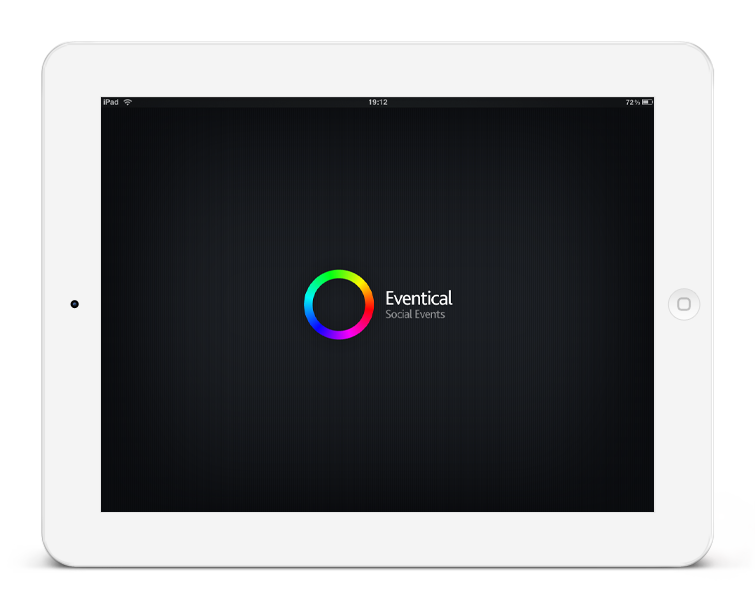
')
As it should be with startups, first we will explain the “problem” that we solved, and which is not that such a problem, simply because it is not obvious at first glance.
Information about exhibitions, museums, theaters and cinema can be easily found in the “Billboard” and other guides. The same information on different cities of the world can be found in online publications like “Time Out” or on services like Yelp, Eventful etc.
But information about user events (social events) - those created by users themselves, is nowhere to be found. And as the trend shows, such events are becoming more and more socially significant and attended. An example of this is the Chick – fil – A campaign , which gathered 674,345 people, and the “Citizen Poet” concert in London, for which Chichvarkin sold 1,500 tickets through Facebook.
That is, these are the events that are created in social networks. However, the user cannot see all the events, for example, the mobile version of Facebook. Facebook is set up in such a way that the user can see events for which he and his friends are going. Using the web version of Facebook, you can find events in the city, but they are not sorted either by date or by the number of people who are going to attend the event.
What if you come to another city where you have no fb-friends? Where to go except cinema and theaters? How to find out what's popular and what sucks? That is why we made EventiCal.
In the application you can:
- see events in your city with a breakdown by
• Today,
• tomorrow,
• this week,
• this month;
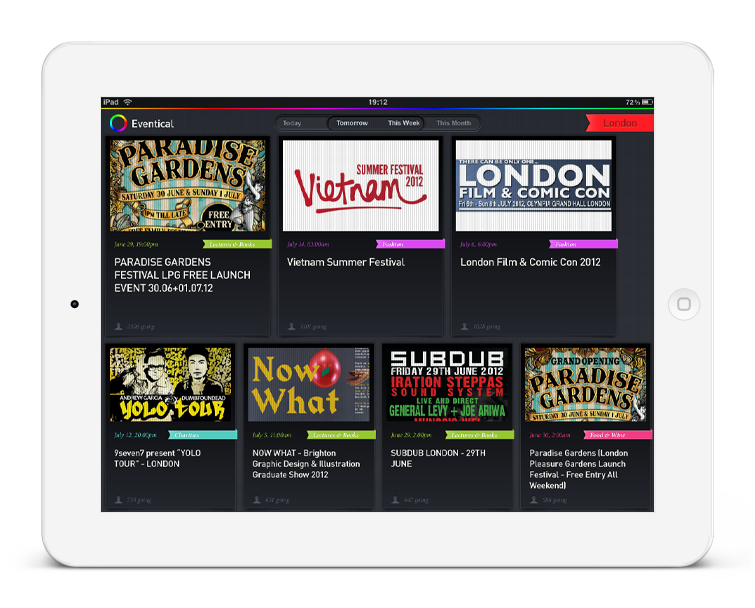
- select another city and see the events on it;
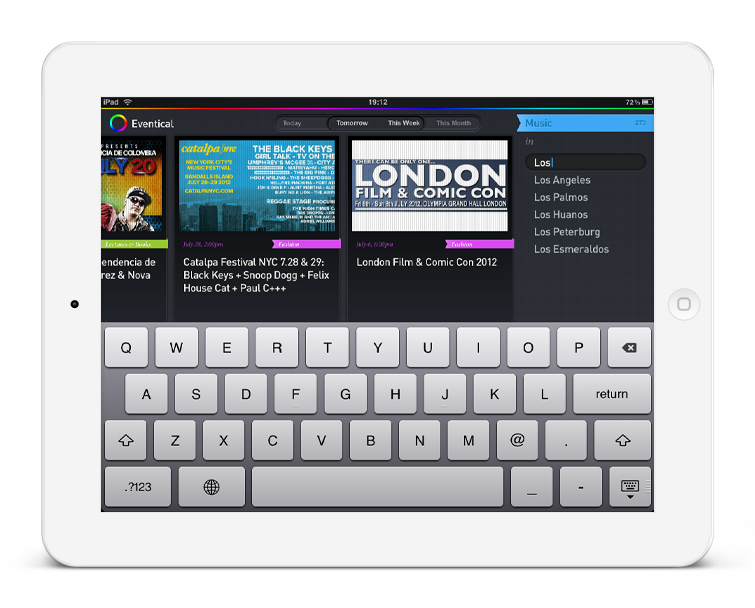
- select a specific category of events;
- see only those events for which the user goes;
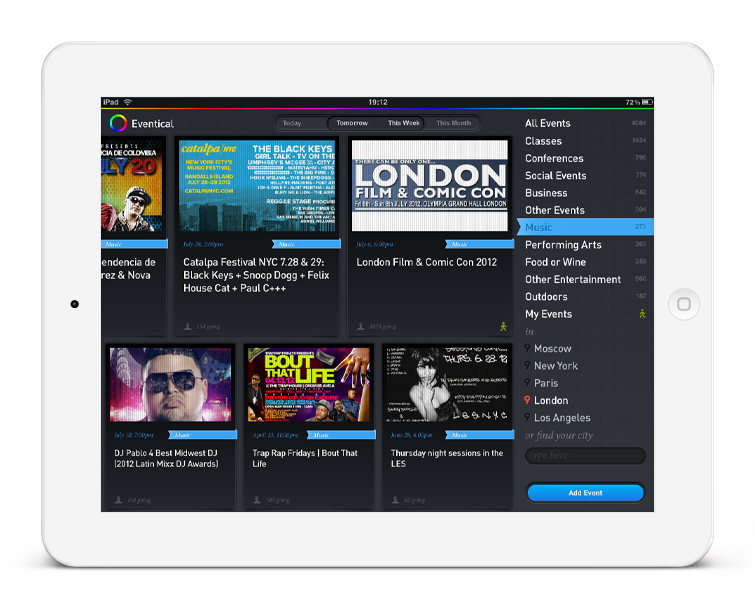
- view the event card and all content on it (description, map, comments, etc.);
- confirm your participation and add an event to iCal or Google Calendar;
- leave a comment to the event;
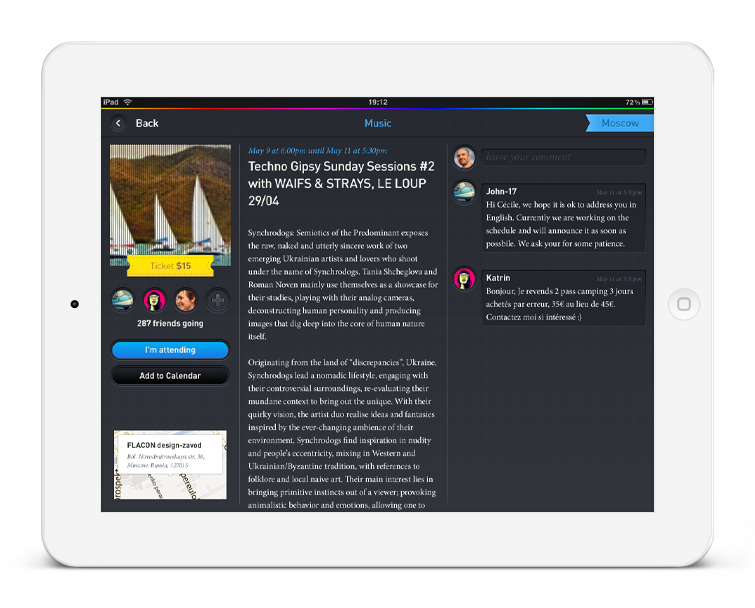
- create your event;
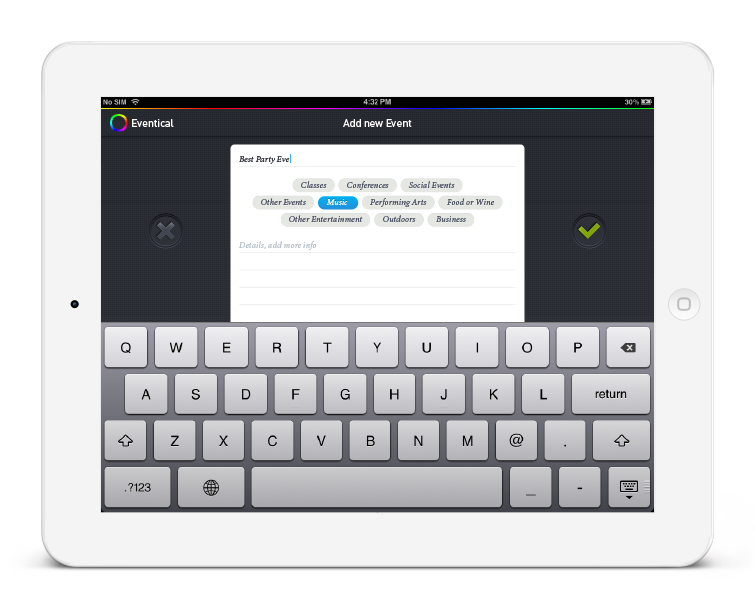
- invite friends and share in social networks.
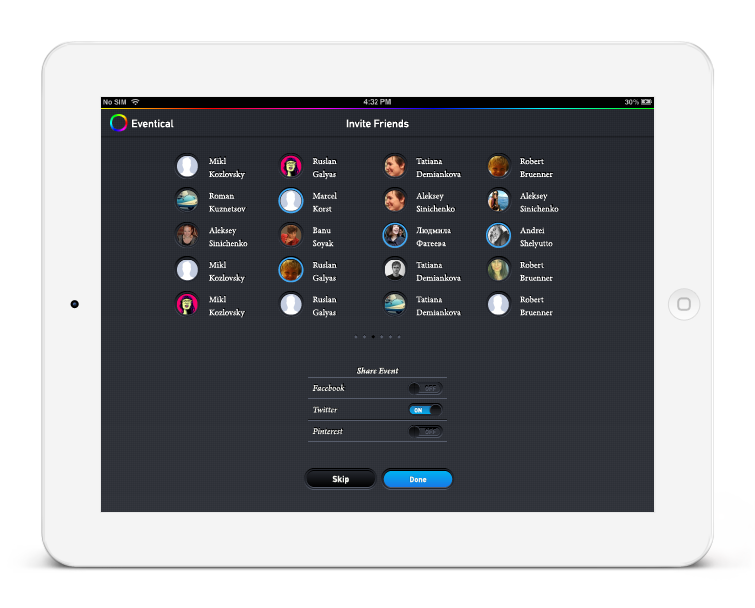
The project is essentially an aggregator of data from FB and works using the Facebook API in terms of content and Google maps in terms of geolocation.
The most difficult part that we have decided, and which is not very interesting to users, is bypassing non-standard Facebook responses - they are all very systematized in terms of geolocation, there are no clear standards for naming the venues. So we took the data that Facebook gives and tried to determine the exact geo-position of a specific event based on them. As a result, a symbiotic solution was found - if the FB does not give us the exact geo-location with coordinates, we specify it using data from Google.
Concerning the collection of content, there were also difficulties. Since the real-time updates on events in the FB does not exist, there is only real-time updates on friends, we wrote a number of constantly operating analyzers, which periodically poll the FB for different updates. Since there are a lot of events and users, these “crowns” are divided into several separate logical processes, each of which is responsible for its area and they do not interfere with each other — they don’t pull too often the same information.
The second problem with obtaining content - FB gives everything very slowly against the background of Google, which responds to requests with space speed. Therefore, in addition to kroons, we also use Rabbit, which is responsible for the parallelization of processes when the user first enters and in some other cases. Thus, a new user can get top-level data as quickly as possible, and all complex and lengthy processing goes into parallel processes.
In general, the application was designed according to the principle - the simpler, the better. This equally applies to the back-up and the interface.
In general, the most delicious in EventiCal is, of course, the interface. We used the principle of parallax to demonstrate billboards. If suddenly someone does not know - the effect of parallax can be observed from the window of a moving train - birches growing closer to the rails rush faster than those that are far away. Similarly, in Eventical, the most popular events are the largest and scroll more slowly than the little-visited = small ones.
The rest of the application meets all the possibilities of aesthetic aesthetics - all kinds of tapas, swipes and scrolls make it lively, native and enjoyable to use.
Separately, I want to highlight the poster with pictures. Since FB gives the pictures of the most different in size and quality, we had to write a separate script for converting graphics into the format we need - converting and fitting to size.
To level the poor quality of the graphics, we came up with the use of masking filters - grids of various patterns to smooth pixel.
To get acquainted with EventiCal, we shot a video in which a beautiful girl demonstrates the capabilities of the application.
At present, EventiCal is available only to those registered on Facebook. In the near future we will add other social networks. You can follow EventiCal news on the Facebook group and on Twitter . If you have wishes - it's time to voice them!
So the idea was born to make a beautiful entertainment application for the iPhone and iPad, which would aggregate different parties and events from social networks in one place.
After three months of fruitful work, we want to put on your court our new application EventiCal . The name is composed of two words “ Event ” and “ Calendar ” and reflects the general essence - the calendar of user events filtered by the user's city.

')
As it should be with startups, first we will explain the “problem” that we solved, and which is not that such a problem, simply because it is not obvious at first glance.
Information about exhibitions, museums, theaters and cinema can be easily found in the “Billboard” and other guides. The same information on different cities of the world can be found in online publications like “Time Out” or on services like Yelp, Eventful etc.
But information about user events (social events) - those created by users themselves, is nowhere to be found. And as the trend shows, such events are becoming more and more socially significant and attended. An example of this is the Chick – fil – A campaign , which gathered 674,345 people, and the “Citizen Poet” concert in London, for which Chichvarkin sold 1,500 tickets through Facebook.
That is, these are the events that are created in social networks. However, the user cannot see all the events, for example, the mobile version of Facebook. Facebook is set up in such a way that the user can see events for which he and his friends are going. Using the web version of Facebook, you can find events in the city, but they are not sorted either by date or by the number of people who are going to attend the event.
What if you come to another city where you have no fb-friends? Where to go except cinema and theaters? How to find out what's popular and what sucks? That is why we made EventiCal.
In the application you can:
- see events in your city with a breakdown by
• Today,
• tomorrow,
• this week,
• this month;

- select another city and see the events on it;

- select a specific category of events;
- see only those events for which the user goes;

- view the event card and all content on it (description, map, comments, etc.);
- confirm your participation and add an event to iCal or Google Calendar;
- leave a comment to the event;

- create your event;

- invite friends and share in social networks.

The project is essentially an aggregator of data from FB and works using the Facebook API in terms of content and Google maps in terms of geolocation.
The most difficult part that we have decided, and which is not very interesting to users, is bypassing non-standard Facebook responses - they are all very systematized in terms of geolocation, there are no clear standards for naming the venues. So we took the data that Facebook gives and tried to determine the exact geo-position of a specific event based on them. As a result, a symbiotic solution was found - if the FB does not give us the exact geo-location with coordinates, we specify it using data from Google.
Concerning the collection of content, there were also difficulties. Since the real-time updates on events in the FB does not exist, there is only real-time updates on friends, we wrote a number of constantly operating analyzers, which periodically poll the FB for different updates. Since there are a lot of events and users, these “crowns” are divided into several separate logical processes, each of which is responsible for its area and they do not interfere with each other — they don’t pull too often the same information.
The second problem with obtaining content - FB gives everything very slowly against the background of Google, which responds to requests with space speed. Therefore, in addition to kroons, we also use Rabbit, which is responsible for the parallelization of processes when the user first enters and in some other cases. Thus, a new user can get top-level data as quickly as possible, and all complex and lengthy processing goes into parallel processes.
In general, the application was designed according to the principle - the simpler, the better. This equally applies to the back-up and the interface.
In general, the most delicious in EventiCal is, of course, the interface. We used the principle of parallax to demonstrate billboards. If suddenly someone does not know - the effect of parallax can be observed from the window of a moving train - birches growing closer to the rails rush faster than those that are far away. Similarly, in Eventical, the most popular events are the largest and scroll more slowly than the little-visited = small ones.
The rest of the application meets all the possibilities of aesthetic aesthetics - all kinds of tapas, swipes and scrolls make it lively, native and enjoyable to use.
Separately, I want to highlight the poster with pictures. Since FB gives the pictures of the most different in size and quality, we had to write a separate script for converting graphics into the format we need - converting and fitting to size.
To level the poor quality of the graphics, we came up with the use of masking filters - grids of various patterns to smooth pixel.
To get acquainted with EventiCal, we shot a video in which a beautiful girl demonstrates the capabilities of the application.
At present, EventiCal is available only to those registered on Facebook. In the near future we will add other social networks. You can follow EventiCal news on the Facebook group and on Twitter . If you have wishes - it's time to voice them!
Source: https://habr.com/ru/post/150524/
All Articles